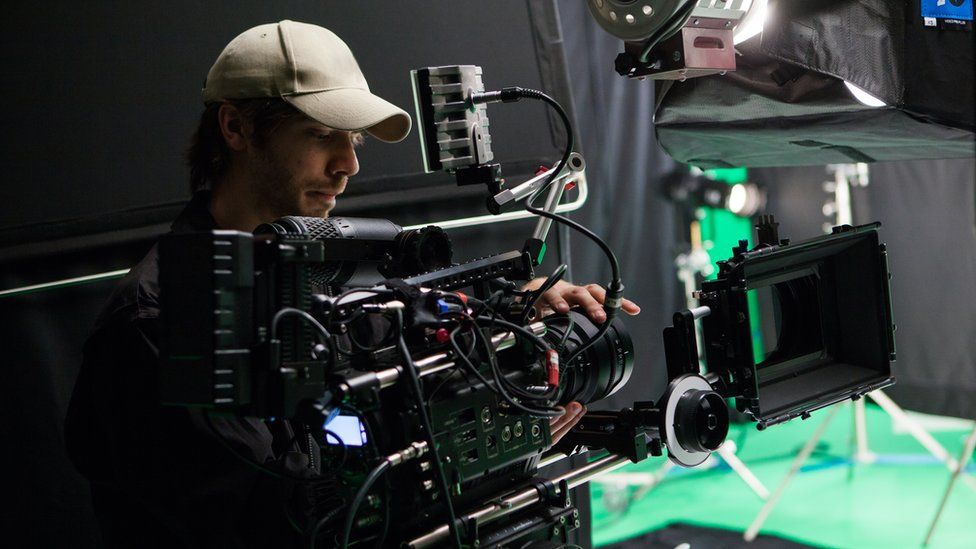ARTICLE AD BOX
 Image source, Getty Images/bjones27
Image source, Getty Images/bjones27
NI Screen said its previous four-year target had been exceeded and so the new one has increased
By Robbie Meredith
BBC News NI Education Correspondent
The TV, film and video game industries should aim to generate more than £430m for the Northern Ireland economy over the next four years.
That is according to Northern Ireland Screen's new 2022-2026 strategy.
It plans to spend about £53m on TV, film and video game production until 2026 to generate an "ambitious and challenging" £431m return.
But there is less money for Irish language and Ulster-Scots broadcasting this year compared to 2021/22.
Northern Ireland (NI) Screen said that was due to the end of "an uplift in funding in 2021/22 following the implementation of commitments within New Decade New Approach".
It included a government commitment to increase funding to the Ulster Scots Broadcast Fund and Irish Language Broadcast Fund.
That "one-off uplift" was provided by the UK's Department for Digital, Culture, Media and Sport (DCMS).
Image source, Reuters
Image caption,Paramount's Dungeons & Dragons, starring Chris Pine, was filmed in Northern Ireland
However, NI Screen's business plan for 2022/23 said "the uplift in funding is not to be sustained in 22/23 and future years".
"A one-year increase in production funding is challenging to manage as it increases demand for the funding from the production companies which cannot be met in future years," it said.
"The reduction in funding from DCMS will impact the number of projects that can be supported and the number of training places and skills development that can be supported in 2022-23."
There will be about £3.9m available for the Irish Language Broadcast Fund in 2022/23 and about £1m for the Ulster Scots Broadcast Fund.
That will fund a number of things including 60 hours of television in Irish, 10 hours of television and some radio in Ulster-Scots and employment for a number of trainees through both funds.
NI Screen's 2022/23 business plan covers the first year of the body's new strategy for 2022-26, called Stories, Skills & Sustainability.
The previous strategy from 2018-2022 included plans to grow the television drama, independent film and animation industries and to increase the number of video game companies.
For instance, NI Screen spent about £300,000 per year on video game production funding until 2022.
The 2018-22 strategy also included an overall target to deliver a minimum of £300m return to the Northern Ireland economy from the screen industries over that period.
NI Screen said that target had been exceeded and so it had been increased for the new 2022-26 strategy.
Line of Duty was among a recent run of successful TV productions filmed in Belfast
"The strategy includes an uplifted economic spend target of £430 million, a 43% increase on the £300 million target for Opening Doors 2018-22," the business plan said.
The Department for the Economy (DfE) provides the majority of NI Screen's income and has increased its funding to almost £18m in 2022-23.
NI Screen's total budget for 2022/23 is about £27m.
Among the recent productions filmed in Northern Ireland which NI Screen has invested money in are Paramount's Dungeons & Dragons, starring Hugh Grant and Chris Pine, and Netflix's The School for Good and Evil, featuring Charlize Theron and Kerry Washington.
Major TV series recently shot in Northern Ireland include Bloodlands and Line of Duty.
Plans have also been unveiled for Studio Ulster - a £25m cutting-edge virtual production studio to be built in Belfast by 2024.
NI Screen's 2022-26 strategy also includes plans to give about 100 people training and placements in the film and TV industry.
The Creative Industries New Entrants programme is funded by the Department for Communities and run by NI Screen in partnership with BBC Northern Ireland.
It will target opportunities to those least likely to enter the industry including to those with a disability, from an ethnic minority or from a lower socio-economic background.

 2 years ago
90
2 years ago
90








 English (US) ·
English (US) ·